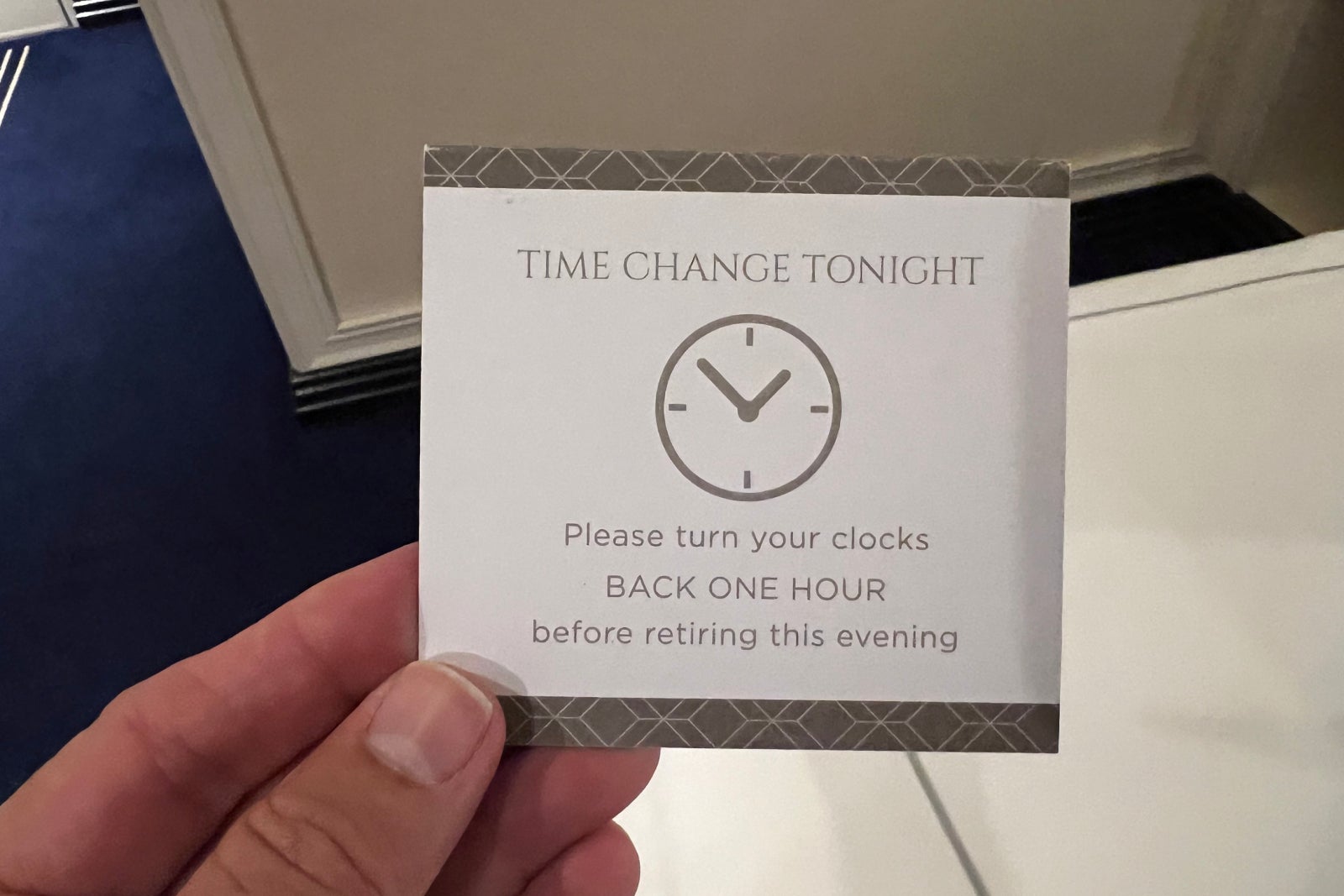Avoid mistakes when traveling according to time zones and daylight savings

On a humid evening in late March a few years ago in London, I learned the hard way that not all countries change their clocks to daylight saving time at the same time. After ordering a glass of white wine at a cozy bar in Bermondsey, I mindlessly scrolled through my phone while the bartenders chatted about the clock jumping ahead this coming Sunday. I almost spit out my Chablis.
Back home in New York City, I skipped an hour on the second Sunday of March. As I frantically Googled, I learned that in England, clocks move forward an hour on the last Sunday in March.
Don’t be like me and lose two hours of sleep in a month. When you travel, remember the following to avoid daylight savings and other time zone errors.
Daylight saving time happens on different days around the world – or doesn’t happen at all
The UK isn’t the only country that changes its clocks on weekends differently than we do in the US. For example, most European countries follow the same calendar as the UK, moving clocks forward one hour on the last Sunday in March and back one hour. hours on the last Sunday of October.
In general, when traveling in spring and autumn, it’s best to check when your country is moving forward or backward – and also whether it’s observing daylight saving time. Are not. Actually, according to Pew Research Centerabout 66% of the world does not have one.
Although daylight saving time is commonly observed in North America and Europe, many non-EU countries in Europe maintain standard time year-round, including Armenia, Azerbaijan, Belarus, Georgia, Iceland , Russia and Turkey.
In 2023, Egypt became the only country in Africa to change its clocks when it reintroduced daylight saving time for its citizens. for the first time in seven years. Now, each year, its clocks advance one hour on the last Friday in April and move back one hour on the last Thursday in October.
Not all states within the same country observe daylight saving time
You should also double-check these even if you are traveling within the US. In 48 states, daylight saving time runs from the second Sunday in March to the first Sunday in November. Arizona and Hawaii are exceptions that adhere to standard time year-round. While this is less of an issue on an island like Hawaii, Arizona has enough borders with other states that follow daylight saving time that it can be problematic.
“Always double check the time when flying in/out and on road trips across the state,” says Becky BlaineTPG senior newsletter editor and Arizona resident. Otherwise, you could be at risk missed flight or make a reservation.

Daily newsletter
Gift your inbox with the TPG Daily newsletter
Join over 700,000 readers to get breaking news, in-depth guides and exclusive offers from TPG experts
For simplicity, remember that Arizona is in the Pacific Time Zone from mid-March to early November, and the rest of the year is in the same time zone as other Mountain Time Zone states.
It’s a similar situation in Canada. In general, Canada follows the same daylight savings schedule as the United States, but most of Saskatchewanfemale Yukon and some parts of Quebec and British Columbia keep standard time year-round.
IN AustraliaDaylight saving time begins on the first Sunday in October and ends on the first Sunday in April in the Australian Capital Territory, New South Wales, South Australia, Tasmania and Victoria, while the Australian Capital Territory Northern, Queensland and Western Australia do not apply.
Private island resorts sometimes create their own time zones
In addition to daylight saving time changes, there are some general time zone issues to keep in mind when traveling.
In countries as large as the US, Canada and Australia, it’s easy to understand why there are so many time zones. But Eric Rosen, TPG’s director of travel content, also points out that in MaldivesThe airport is in a different time zone than some resorts in the small island nation.
Technically, the Maldives has only one official time zone: Maldives Time, which is five hours ahead of Coordinated Universal Time, also abbreviated as UTC. However, some of the archipelago’s private island resorts add an hour to Maldives Time to maximize evening light for their guests.
For example, St. Regis Maldives Vommuli set the clock one hour ahead of the official clock to what they call “Island Time” but also provide guests with a butler to coordinate transfers to and from the airport so no one accidentally misses their flight.
Before visiting the Maldives, be sure to check if your resort does this.
Related: There’s a surprising reason why some hotels have their own time zones
Some places have half hour time zones
Due to its geographical location, the Canadian island of Newfoundland is 90 minutes ahead of Eastern Time instead of only 60 minutes ahead like the rest of Atlantic Canada. During the July trip, Nick EwenTPG’s senior editorial director, sees this as a challenge for calendar purposes.
While traveling in Newfoundland, he received an invitation from Outlook for a dinner meeting at 7:30 p.m. the following week and accepted without thinking much about it. However, the actual dinner back home in the US starts at 6pm Eastern time, a detail he completely missed until the reminder appeared 15 minutes earlier – at which point he realized I’ll be late.
Other locations 30 minutes off UTC include India, Sri Lanka, Afghanistan, Iran, and some states in Australia. Want to be even more confused? Nepal’s time zone is off by 45 minutes due to its geographical location.
Pay attention to your digital calendar
Even without dealing with half-hour time zones, you can easily make the same mistake when adding events back home to your digital calendar when traveling in another time zone.
“Last year, I took my middle son to a birthday party. We arrived a few minutes late, but when we arrived it seemed like the party was almost over,” he said. Leader Taraha senior writer at TPG. “While the kids were eating cake, I double-checked my calendar to make sure we were on time, and it looked like we were on time. But then I went to check the invitation and it was in fact We arrived an hour late.
Her mistake? When she entered the party into her calendar while traveling, her calendar app defaulted to showing the time zone she was in and showed her the wrong home time.
“Now, I always switch back to my home time zone if I enter appointments into my calendar while traveling,” she says.
Another trick?
“Outlook allows you to display up to three time zones on the calendar,” says Madison BlancaflorEditor manages TPG’s content activities.
Go to settings > calendar > time zone. Then check the “show second time zone in Day and Week views” box below your default time zone. Need a third one? You can also check that box.
Cruise ships frequently cross multiple time zones
It’s important to remember that you can quickly encounter multiple time zones on cruises – especially on transoceanic cruises, where you’ll be changing time zones every day or nearly every day. And if you’re cruising across the Pacific, it could take you all day to cross the Pacific. International date linealike Clint Hendersona managing editor of TPG, did so when he first sailed from Seward, Alaska to Tokyo.
Even on shorter trips, check to see if you have to change time zones. “I was on a week-long trip from Portugal to Spain and we had to change time zones back and forth in just one day,” said. Erica SilversteinTPG’s cruise management editor.
Flight attendants often leave notes on your bed when setting dinner times to remind you of upcoming time changes. Henderson said he has to set his clocks back one to two hours every night on his cruise. But Silverstein said you can’t always rely on your cell phone to tune in at the right time when it’s in airplane mode and accessing satellite-based internet. She recommends bringing an analog clock or alarm clock to ground yourself if you don’t know whether your device is updating properly.
Related: Can an itinerary help with jet lag? The answer may surprise you
Bottom line
When traveling, don’t assume every country or state follows the same daylight saving time rules and schedules as where you live, and be aware of time zone irregularities. Losing or gaining an unplanned hour can lead to lost sleep, being late to an event, and worst of all, missing your flight.
Related reading:










